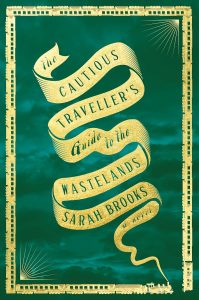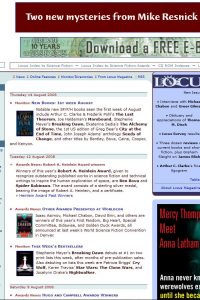Ian Mond Reviews The Cautious Traveller’s Guide to The Wastelands by Sarah Brooks
 The Cautious Traveller’s Guide to The Wastelands, Sarah Brooks (Flatiron Books 978-1-25087-861-8, $28.99, 336pp, hc) June 2024.
The Cautious Traveller’s Guide to The Wastelands, Sarah Brooks (Flatiron Books 978-1-25087-861-8, $28.99, 336pp, hc) June 2024.
I was surprised to discover that there are few novels, vintage or contemporary, set on the Trans-Siberian Express. There are plenty of memoirs and travel guides, but, unlike the Orient Express, with its Agatha Christies and Graham Greenes, very little fiction. The irony is that Sarah Brook’s eerie debut novel, The Cautious Traveller’s Guide to The Wastelands, won’t technically add to that number because while the story takes place on the Trans-Siberian Express, it’s not our Trans-Siberian Express. Brooks’s Trans-Siberian Express links Moscow with China, rather than Vladivostok, while transforming the Urals, the Siberian steppe and the world’s largest freshwater lake into the Greater Siberian Wastelands, a devastated, corrupted land – a cross between the Strugatsky brothers’ Zone and Jeff Vandermeer’s Area X – populated by strange phenomena and mutated flora and fauna ‘‘inimical to our sense of all that is decent and human and good.’’ As for the train, like its real-world counterpart, it’s a luxurious experience with beautifully appointed cabins for those who can afford it (third class get the cramped bunks at the back). But on the exterior, it’s a very different beast. As described by Valentin Rostov, author of the titular ‘‘Guide to the Wastelands’’:
[The train is] twenty carriages long and as tall as the great gates of St Andrei’s Cathedral, with towers at either end; a moving fortress of iron and armor to plow the great iron road that must itself stand as one of the new wonders of the world.
The first passenger we encounter is Marya Petrovna Markova, the ‘‘woman… with a borrowed name,’’ who, as we come to discover, is masquerading as a grieving widow. In truth, she’s the daughter of the master glassmaker who fashioned the large windows that line the train. During the last voyage, those very same windows cracked, letting in some of the Wasteland. Marya’s father was blamed, his contract cancelled, his reputation tarnished. Marya was the one who found her father’s body in his office, supposedly dead from a heart attack, and yet there was water ‘‘pooling beneath [his] face, grains of sand on his cheek.’’ With her father’s papers taken by the Trans-Siberia Company, Marya believes there’s more to his death and that the answers will be found on the train. Like Marya, Doctor Henry Grey searches for the truth. With the Royal Scientific Society debunking his theory that ‘‘animals contain within them the blueprints for their eventual evolution,’’ the naturalist has become a laughingstock. Humiliated but not beaten, Grey has boarded the train in the hope of finding redemption and proof of his theories in the unique ecology of the Wastelands, even if it means endangering everyone onboard. Unlike Marya and Grey, our third protagonist isn’t a passenger but rather a unique member of the crew. Zhang Weiwei, the child of the train, was born during a trip between Moscow and China and has lived on board ever since. Now sixteen, she is a steward, scuttling between First and Third Class (there is no Second), assisting where she can. Knowing all the nooks and crannies on the train, Weiwei finds a stowaway early in the journey: an enigmatic girl named Elena, unlike anyone Weiwei has ever encountered.
With the smart, measured use of Rostov’s Guidebook, Brooks neatly and efficiently establishes her world. She never explains how the Wasteland came to be, but this only feeds an atmosphere of dread that hangs over the passengers and crew, dread that becomes outright horror when, inevitably, events go pear-shaped. But even then, Brooks doesn’t overplay her hand. She expertly draws out the tension, especially when the train comes under attack from the mutated horrors lurking in the Wasteland. It’s all told in elegant prose that’s never baroque but finds a particular sort of beauty in the strange and uncanny.
Underlying all this weirdness is a somewhat nuanced story about class. That there’s a vast divide in how the First- and Third-class passengers are treated isn’t entirely surprising, given the novel is set during the dying stages of the 19th Century. And, as awful as it is, I can’t say I was shocked when, after the train starts leaking water, the brooding representatives from the Trans-Siberia Company (dubbed the ‘‘Crows’’) order the captain to cut off the water supply to Third Class. It’s with the climax that Brooks boldly undercuts the period’s embedded beliefs concerning class. With the train under attack, divisions dissolve as people are forced together to face a common threat. What’s unexpected – and here I tread carefully not to ruin a bold, ambitious, and emotionally satisfying ending – is that the class divide is never re-asserted. The train changes in multiple ways, most notably the forming of a community, one that has little time for the Trans-Siberia Company and its owners. What I’m saying is that I didn’t expect the novel to take such a turn, to become what’s essentially a story about a socialist utopia. How The Cautious Traveller’s Guide to The Wastelands gets there and why is for you to discover; a journey well worth taking.
Ian Mond loves to talk about books. For eight years he co-hosted a book podcast, The Writer and the Critic, with Kirstyn McDermott. Recently he has revived his blog, The Hysterical Hamster, and is again posting mostly vulgar reviews on an eclectic range of literary and genre novels. You can also follow Ian on Twitter (@Mondyboy) or contact him at mondyboy74@gmail.com.
This review and more like it in the June 2024 issue of Locus.
 While you are here, please take a moment to support Locus with a one-time or recurring donation. We rely on reader donations to keep the magazine and site going, and would like to keep the site paywall free, but WE NEED YOUR FINANCIAL SUPPORT to continue quality coverage of the science fiction and fantasy field.
While you are here, please take a moment to support Locus with a one-time or recurring donation. We rely on reader donations to keep the magazine and site going, and would like to keep the site paywall free, but WE NEED YOUR FINANCIAL SUPPORT to continue quality coverage of the science fiction and fantasy field.
©Locus Magazine. Copyrighted material may not be republished without permission of LSFF.






